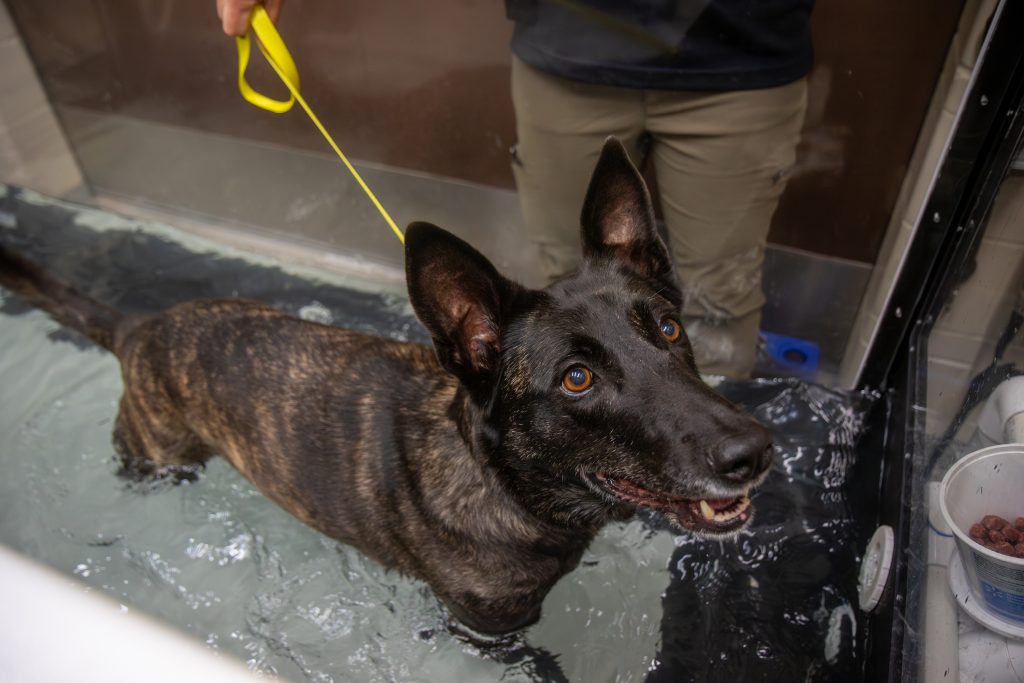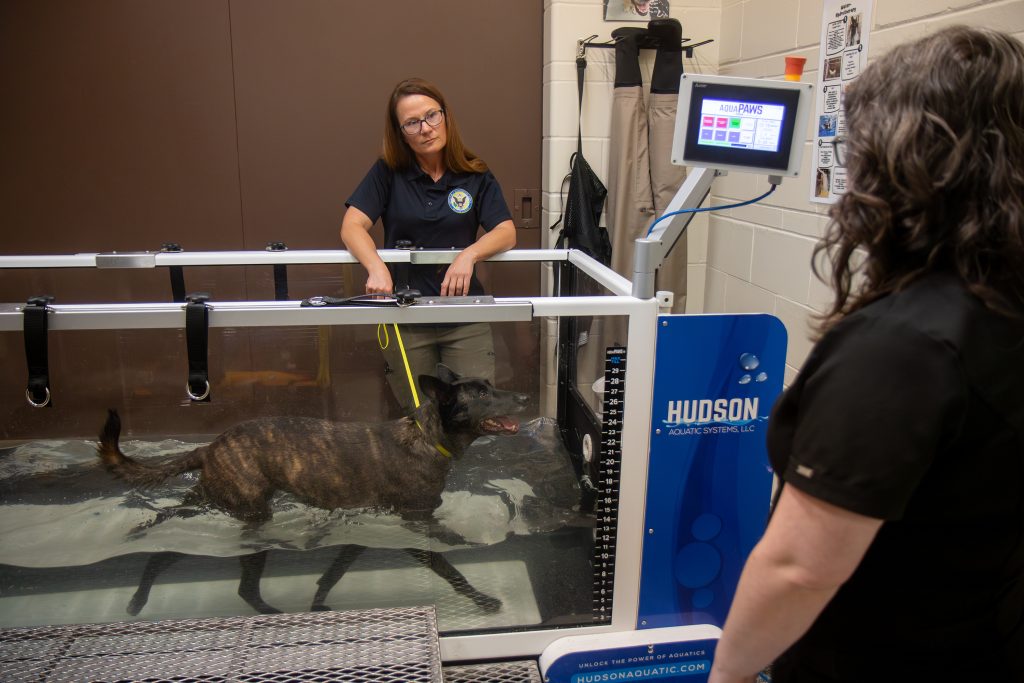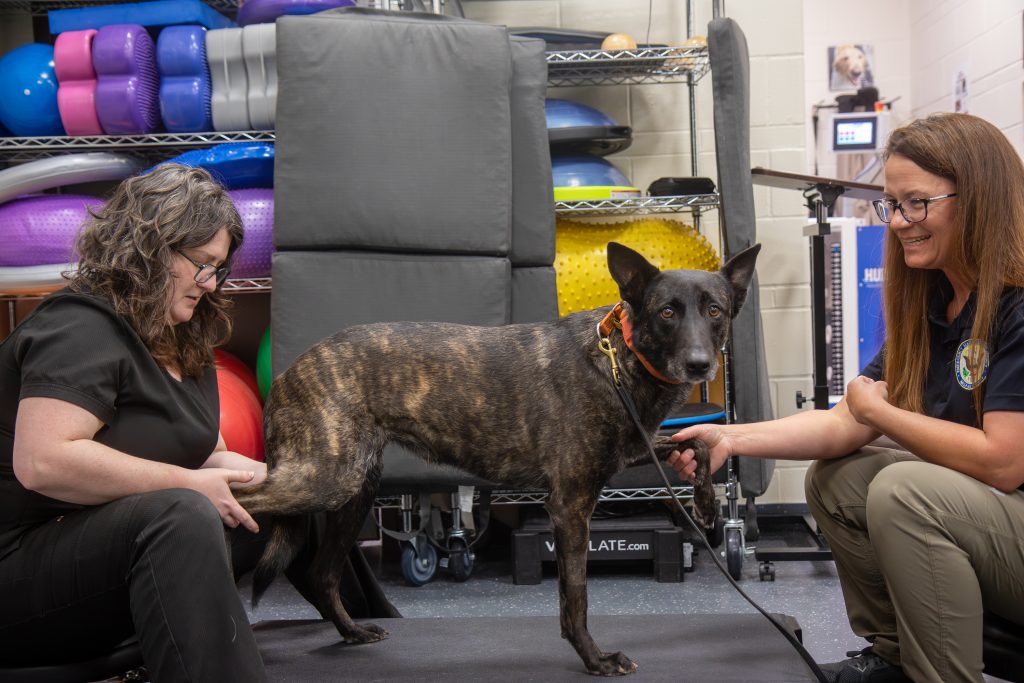Published on
Updated on

Published 4/17/25
Story contact: Nicholas Childress, CVMMarCom@missouri.edu
Photos by Karen Clifford
When search-and-rescue teams deploy, they need every member — human and canine — to be at their best. For Kathleen Kelsey, a handler with Missouri Task Force One, that means keeping her partner, Oma, healthy and ready for anything. A seven-year-old Dutch Shepherd, Oma has responded to high-profile emergencies, including the 2023 Hawaii wildfires and recent hurricanes in North Carolina, navigating hazardous terrain to help find disaster victims.
Highly-trained working dogs like Oma face intense physical demands that go far beyond the typical pet’s experience. Long hours, dangerous environments and physically complex tasks require peak performance. That’s where the University of Missouri College of Veterinary Medicine’s Sports Medicine and Rehabilitation Service comes in.

Bess Pierce, DVM, MS, DABVP, DACVIM, DACVSMR (Canine), leads Mizzou’s Sports Medicine and Rehabilitation Service and works directly with handlers like Kelsey to keep working dogs mission ready. “These dogs are elite athletes, and we treat them that way,” Pierce said. “It’s not just about rehabilitation; it’s about performance medicine and keeping them in optimal condition to do their work with a comprehensive approach to health and athletic performance.”
For Oma, that proactive, performance-focused approach has been critical. Oma has mild lower back pain, common in working dogs, and specialized imaging tools of CT and MRI were utilized to accurately identify the underlying problems. Pierce then designed a customized plan to strengthen her core, boost endurance and keep her pain-free. “You don’t wait for an injury to occur — you prepare the animal for the demands of the job,” Pierce said. Oma’s program includes tailored workouts, therapeutic treatments and an at-home exercise routine that Kelsey follows closely to keep her pup in peak form.

Kelsey said Mizzou’s support has extended Oma’s working life and effectiveness. “I’m grateful to have access to Dr. Pierce and her team,” Kelsey said. “As a K9 handler, having a customized program that keeps Oma healthy and doing the work she loves makes all the difference. The sports medicine team is fully invested in her well-being; I couldn’t ask for a more dedicated group.”
The life of a search-and-rescue dog
Kelsey’s passion for search and rescue began in the wake of 9/11, when reports of dogs working at Ground Zero highlighted their importance in disaster response. “I knew I wanted to work with dogs, and after 9/11, there was a huge increase in awareness about the need for trained search-and-rescue dogs,” she said. “That event reinforced my commitment to this work and made me want to contribute in any way I could.”
Since 2003, Kelsey has trained and worked with six search-and-rescue dogs, each partnership built on trust, endurance and dedication. She knows firsthand how critical it is to keep her canine teammates sharp. “Our dogs need endurance, strength and the ability to maintain focus, even when conditions are difficult,” Kelsey said.
According to Pierce, search-and-rescue dogs face two major challenges in their preparation: endurance and strength for extended duration searching and tracking, and the ability to navigate unstable, rubble-filled environments. “These dogs need to perform precise movements in unpredictable settings,” said Pierce. “We help them with proprioception, which is their body’s ability to know where it is in space and adjust accordingly, and build strength, so that they can support their bodies well and avoid injuries.”
Working dogs and beyond
While Oma’s care is tailored for search-and-rescue, Mizzou’s Sports Medicine and Rehabilitation Service supports a wide range of canine patients — from national dock-diving champions to post-surgical family pets to elder dog mobility and comfort.
“We apply the same science and technology across the board,” Pierce said. “Every patient deserves to move, work or play without pain.”
For handlers like Kelsey, the collaboration with Mizzou ensures their dogs stay healthy, resilient and ready to respond — no matter the mission.